Posts Tagged ‘Burma Partnership’ (399 found)
The Situation of Refugees on the Thai-Burma Border
This briefing paper looks at the current situation in Burma’s ethnic areas, the areas that refugees would be returned to, and shows how the conditions are not yet in place for their return. Furthermore, it highlights the need for the refugees to be included in these processes and lays out refugees and community-based organization’s preconditions for their return […]
• • •Participation and Inclusion in Burma, Empty Words
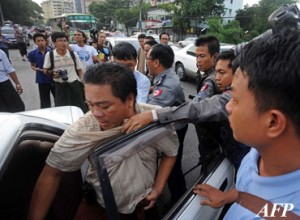 Today, 10 December marks the United Nations’ Human Rights Day. This year’s theme is inclusion and the right to participate in public life, but these concepts are conspicuously absent in Burma today, as recent events have proved.
Today, 10 December marks the United Nations’ Human Rights Day. This year’s theme is inclusion and the right to participate in public life, but these concepts are conspicuously absent in Burma today, as recent events have proved.
The Office of the High Commissioner for Human Rights (OHCHR) identifies inclusion and the right to participate in public life as “essential elements in achieving the full range of human rights for all of us… the fulfillment of the right to participate is fundamental to the functioning of a democracy and an effective human rights protection system. When the right to participate and inclusion are respected, each and every one of us is offered the opportunity to join in the debate, to offer ideas and to campaign for change.”
To commemorate this day, Daw Aung San Suu Kyi joined the OHCHR’s event in Geneva as the keynote speaker via satellite, serving as both an advocate for participation in public life and an example of a person and a place where this right to participation was, and in many cases still is, absent. One of the largest challenges facing Burma today and in the future is whether the government is willing and able to provide this basic human right of inclusion and participation to all of its citizens […]
Take Action: Release Letpadaung Protest Prisoners!
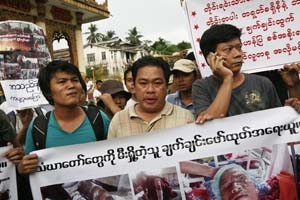 When US President Barack Obama travelled to Burma last month, in his speech at the University of Rangoon, he spoke about the need for freedom of expression and said that the “United States of America is with [the people of Burma].” Please join us in calling on President Obama to live up to his words and demand the Burma government to release all political prisoners, including those arrested for protesting against the Letpadaung copper mine in Monywa, northern Burma.
When US President Barack Obama travelled to Burma last month, in his speech at the University of Rangoon, he spoke about the need for freedom of expression and said that the “United States of America is with [the people of Burma].” Please join us in calling on President Obama to live up to his words and demand the Burma government to release all political prisoners, including those arrested for protesting against the Letpadaung copper mine in Monywa, northern Burma.
Two weeks after Obama’s trip to Burma, we witnessed the most brutal crackdown on freedom of expression since President Thein Sein took office. In the early morning of 29 November, riot police raided peaceful protest camps near the Letpadaung copper mine, firing water cannons, tear gas and incendiary devices into the camps. More than 60 monks were injured, many with 3rd degree burns. Police also arrested 8 activists in Rangoon who organized protests against the mine and the crackdown, as well as Ashin Gambira, a monk leader of the 2007 Saffron Revolution. They are all currently being held in Insein Prison […]
Violent Crackdown Against Buddhist Monks, New Regime with an Old Method
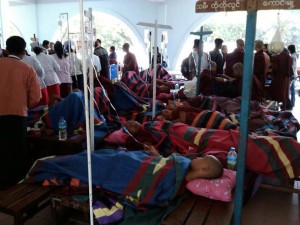 Thein Sein’s government has revealed its true colors with the surprisingly reckless and bloody crackdown on peaceful protesters in Monywa, Sagaing Region. The crackdown on the protest camps came at 3am, without any chance for the protesters to withdraw. It was an ambush and an old tactic that characterizes the old military regime that the world has been trying to believe has reformed.
Thein Sein’s government has revealed its true colors with the surprisingly reckless and bloody crackdown on peaceful protesters in Monywa, Sagaing Region. The crackdown on the protest camps came at 3am, without any chance for the protesters to withdraw. It was an ambush and an old tactic that characterizes the old military regime that the world has been trying to believe has reformed.
The Letpadaung copper project near Monywa – the largest copper mine in Burma – is a joint venture between military-owned Union of Myanmar Economic Holdings Ltd., and Wan Bao, a unit of the weapons manufacturer China North Industries Corp. The project has been facing a growing objection since August by the local communities in the Letpadaung area who say the project has confiscated as many as 7,800 acres of land, forcing them out of their villages and ruining the environment.
Riot police aggressively dispersed protesters using water cannons, tear gas and, according to protesters, incendiary devices that set the camps on flames leaving at least 50 people injured by the fire. Many of those who were severely wounded were Buddhist monks […]
• • •Burma’s Reform Process Must Include Ending Violence Against Women
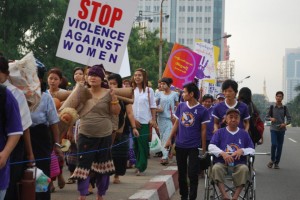 Yesterday, as on every 25 November, women and men around the world celebrated the International Day for the Elimination of Violence against Women. Violence against women takes many forms, physical, sexual, psychological and economic and occurs all around the world and in every culture. Burma is no exception to that rule.
Yesterday, as on every 25 November, women and men around the world celebrated the International Day for the Elimination of Violence against Women. Violence against women takes many forms, physical, sexual, psychological and economic and occurs all around the world and in every culture. Burma is no exception to that rule.
Women in Burma, and in particular in ethnic nationality areas, are the victims of sexual violence, sexual exploitation, human trafficking and discrimination. In addition, in situations of armed conflict and extreme poverty, they are often amongst the most vulnerable population and they bear the burden of war and displacement.
Rape has been used as a weapon of war by the Burma Army in ethnic areas for decades. In Kachin State where fighting has been ongoing for more than one year, the Kachin Women’s Association – Thailand (KWAT) has documented that Burma Army troops have committed sexual violence against at least 61 women and children, about half of whom were killed […]
• • •“The Political Prisoners Game”
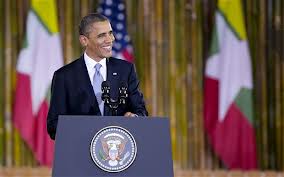 As US President Barack Obama visited Burma today, the Thein Sein government continues to pursue positive headlines in a cynical move to release political prisoners at the same time as Obama’s arrival.
As US President Barack Obama visited Burma today, the Thein Sein government continues to pursue positive headlines in a cynical move to release political prisoners at the same time as Obama’s arrival.
Last Thursday’s release of 452 prisoners was a huge disappointment as no political prisoners were among them, with the Assistance Association for Political Prisoners calling it “the worst amnesty ever”. Today, 19 November, however, at the time of publication 45 political prisoners have been released. This ploy by the government usually coincides with a visit of an international figure or a decision made by the international community on Burma. In September, 87 political prisoners were released the week before President Thein Sein went to New York for the UN General Assembly. In July, 25 political prisoners were released shortly before the US lifted its investment ban and Thein Sein met with US Secretary of State, Hillary Clinton, in Cambodia. This time, it is because President Obama is coming to Burma. “It seems there is a new game in Burma, which is the political prisoners game,” Phil Robertson from Human Rights Watch stated, highlighting the lack of integrity of these releases […]
Obama’s Upcoming Visit Provides Hope and Potential Danger for Burma’s Transition
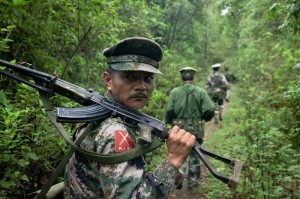 One of the first things that re-elected US President Barack Obama announced was a visit to Burma to coincide with the East Asia Summit in Phnom Penh. While it is true that the possibility of such a visit shows the progress Burma has made, it is also dangerous in that it bestows an excessive amount of legitimacy on a military backed government that continues to commit grave human rights violations, particularly in ethnic areas.
One of the first things that re-elected US President Barack Obama announced was a visit to Burma to coincide with the East Asia Summit in Phnom Penh. While it is true that the possibility of such a visit shows the progress Burma has made, it is also dangerous in that it bestows an excessive amount of legitimacy on a military backed government that continues to commit grave human rights violations, particularly in ethnic areas.
While President Obama is in Burma, he should highlight and condemn human rights abuses, not only in Arakan State, but in all areas. Meanwhile, this would be a perfect opportunity for the US to learn of some of the unintended consequences of lifting sanctions. The huge increase in land confiscations by military elites and their cronies is dispossessing more and more people every day. The imminent rush of foreign direct investment, such as that from the US, is catalyzing this process […]
2012 ANNI Report on the Performance and Establishment of National Human Rights Institutions in Asia
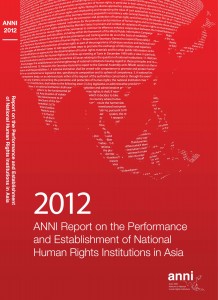 The past couple of years have seen an increasing international recognition of the role of NHRIs in the promotion and protection of human rights. A growing number of Asian countries have either recently established or are considering the establishment of NHRIs, including in Burma, where the Myanmar National Human Rights Commission (MNHRC) was set up in September 2011. Meanwhile the UN Human Rights Council on 16 June 2011 adopted a resolution on “National Institutions for the Promotion and Protection of Human Rights” – the first-ever Human Rights Council resolution to focus specifically on the work of NHRIs.
The past couple of years have seen an increasing international recognition of the role of NHRIs in the promotion and protection of human rights. A growing number of Asian countries have either recently established or are considering the establishment of NHRIs, including in Burma, where the Myanmar National Human Rights Commission (MNHRC) was set up in September 2011. Meanwhile the UN Human Rights Council on 16 June 2011 adopted a resolution on “National Institutions for the Promotion and Protection of Human Rights” – the first-ever Human Rights Council resolution to focus specifically on the work of NHRIs.
The resolution acknowledges the significant role of NHRIs in the promotion and protection of human rights at national level, as well as their important role in the Human Rights Council, and calls for further cooperation with regional coordinating bodies of NHRIs. These developments are set against the backdrop of a general deterioration in the situation of human rights in many countries in Asia. This can be seen, for example, in the adoption of various repressive laws such as national security laws […]
• • •Latest Opium Cultivation Figures for Burma Maintain Worrying Status Quo
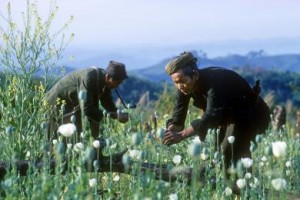 A UN Office on Drugs and Crime report released last week reveals that opium cultivation has increased in Burma for the sixth consecutive year. In 2012 there will be an estimated 690 tons of opium grown in the country, a 17% increase from last year and double that of six years ago.
A UN Office on Drugs and Crime report released last week reveals that opium cultivation has increased in Burma for the sixth consecutive year. In 2012 there will be an estimated 690 tons of opium grown in the country, a 17% increase from last year and double that of six years ago.
Poverty, caused by the inability of people to participate in sustainable livelihoods due to armed conflict and repression is a causal factor for this increase in opium cultivation. There has been much focus on Burma over recent political developments, the release of political prisoners and the easing of media restrictions. However, there has been very little focus on the lack of alternatives for people living in the conflict areas of Shan and Kachin States, where the majority of opium production occurs. There is a direct link between ongoing conflict and opium cultivation. “There is no question that there is a strong connection between the conflicts in the country and the most immediate sources of revenue to purchase weapons, and in many instances this is both opium and heroin and methamphetamine pills,” says Gary Lewis, the United Nations Office on Drugs and Crime regional representative […]
Keep Human Rights on the Agenda for Burma
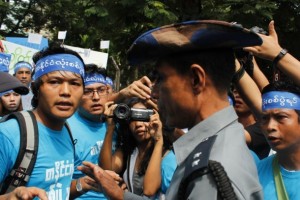 This week Tomás Ojea Quintana, the Special Rapporteur on the situation of human rights in Burma, presented his latest report to the United Nations General Assembly (UNGA) that will adopt, in a few weeks, its annual resolution on the situation of human rights in the country.
This week Tomás Ojea Quintana, the Special Rapporteur on the situation of human rights in Burma, presented his latest report to the United Nations General Assembly (UNGA) that will adopt, in a few weeks, its annual resolution on the situation of human rights in the country.
Since the lifting of sanctions and the renewal of diplomatic ties with the Burma government by many foreign countries, the UNGA resolution is one of the last tools remaining in the hands of the international community to encourage the government to turn the preliminary changes of the last year into more concrete democratic reforms.
Despite recent developments in Burma, the root causes of armed conflict still haven’t been addressed and human rights violations are ongoing, serious and prevalent throughout the country.
This week, the violence in Arakan State errupted again with more than a hundred victims in a week. Meanwhile, fighting in Kachin State continues and Mr. Quintana said in his press statement, “I have received allegations of attacks against civilian populations, extrajudicial killings, sexual violence, internal displacement, torture, forced labour and portering, as well as the ongoing use of landmines and the recruitment of child soldiers, by all parties to the conflict.” […]
• • •








 All posts
All posts